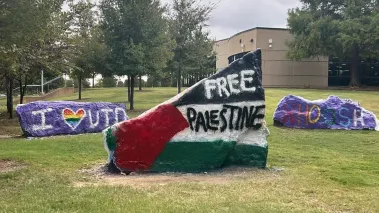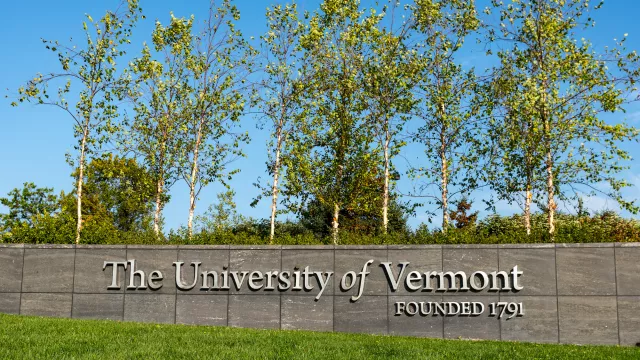Table of Contents
FIRE to UT Dallas: Restore free speech rocks to campus

@utdrockwars / Instagram.com
The "Spirit Rocks" at University of Texas at Dallas before they were removed, with one rock emblazoned with the words "Free Palestine."
Many colleges or universities these days have a public space — usually a wall or boulder — where students may write messages to the campus community. At Duke University, it’s the Free Expression Bridge. At Carnegie Mellon, it’s a concrete fence. And at the University of Texas at Dallas, students left messages on the school’s renowned “Spirit Rocks.” But not anymore.
Last semester, after students took to the rocks to express their views on the Palestinian crisis, UT Dallas decided the speech was too political. So what did the school do? It removed the rocks completely.
What were the UT Dallas Spirit Rocks?
Students used the Spirit Rocks — three large, conspicuous boulders located on the campus quad since 2008 — for a variety of displays, which included political messages. And that was allowed, both by the letter of UT Dallas’s policy and by its tolerance of political messaging on the rocks.
The Spirit Rocks policy stipulated that paintings on the rocks could “include but are not limited to event announcements, words of support and congratulations, welcome notes or creative endeavors.” This language suggests the university envisioned the rocks as being used for school-spirit related purposes — but, critically, it did not foreclose the rocks’ usage for other types of messages.
Nor did the school silence other political messages over the years. A Spirit Rocks Instagram page devoted to cataloging the various paintings and messages on the rocks showed messages that included political slogans like “Vote Blue” and “UTD 4 Socialism.” Local media also quoted a UTD student who said students had used the rocks for political expression like protesting Supreme Court rulings and police brutality. This historic use for political expression demonstrates the university allowed use of the rocks, at the very least, as a limited public forum for student speech. Accordingly, it cannot now discriminate on the Spirit Rocks’ use or availability based on viewpoint.
Removing ‘Spirit Rocks’ is a blow to free speech at UT Dallas
In the aftermath of the Oct. 7 Hamas terror attacks in Israel, the university initially sounded the right notes regarding student expression. On Oct. 16, University President Richard Benson publicly praised civil disagreement on the issue, saying, “Students are conversing about their differences; they are gathering donations and peacefully protesting; they are shaking hands[.]” In a subsequent statement responding to criticisms that he did not sufficiently acknowledge suffering endured by Palestinians, Benson also asked the campus community to “rededicate ourselves to presuming good faith on the part of others and to listen with kindness and empathy.”
Closing off avenues for student expression sends the wrong message — that when administrators disapprove of student speech, they will simply remove forums for students to express themselves.
It took about a month for student expression on the Spirit Rocks to become too much for the university. Students used the rocks for expression about the Israeli-Palestinian crisis, with such messages including the phrase “Zionism = Nazism,” sparking tension on campus.
Instead of doubling down on the importance of free expression, UT Dallas announced on Nov. 20 that the university had removed the rocks from campus, as the political messages were inconsistent with the rocks’ original purpose. “The spirit rocks were not intended to be a display for extended political discourse, and because painted messages have been negatively impacting people on and off campus, our best solution was to remove them,” the university said. The removal of the rocks appears to have united the campus in opposition, as an Instagram poll conducted by the student newspaper The Mercury found that 92% of 1,532 students disagreed with the rocks’ removal.
That “best solution” harms the culture of free speech on campus. Instead of communicating to the student body that offensive political expression remains protected, UT Dallas pulled the plug on a highly visible and often used outlet for student expression. This sends the unmistakable, speech-chilling message that the administration will abandon free speech principles when student expression risks offending others.

Records obtained by FIRE cast doubt on University of Vermont’s rationale for forcing pro-Palestinian event online
The university cited security concerns in refusing to host the event in person, but has lacked transparency regarding their substance.
FIRE wrote the university on Dec. 1 urging it to restore the rocks to campus. As we told the university, removing the rocks both harmed free speech culture and could represent viewpoint discrimination:
By providing the rocks for students’ political (and other) messages, UT Dallas created, at the very least, a limited public forum for student speech. Allowing the rocks’ use for political expression does not prevent UT Dallas from imposing reasonable time, place, and manner restrictions. But because UT Dallas has both in policy and practice continuously held open the rocks for the purpose of student expression, including political speech, it cannot now limit that speech—or cut it off entirely—because it disfavors some of the views expressed. Doing so not only harms the environment for free speech on campus, teaching students an unfortunate lesson about how to react to speech with which one disagrees, but also constitutes impermissible state discrimination based on viewpoint.
To be sure, governments are able to close limited public forums. But they can’t do so for viewpoint-discriminatory reasons. Here, if the university allowed use of the rocks for political messaging in the past, but now decided the viewpoints expressed by students about the Israeli-Palestinian crisis were too potentially inflammatory, that represents impermissible viewpoint discrimination. Or if it decided that commentary on other social issues is permissible but that expression about the Israeli-Palestine conflict (on either side) is not, that, too, discriminates based on viewpoint. As we told the university, a public institution “must abstain from regulating speech when the specific motivating ideology or the opinion or perspective of the speaker is the rationale for the restriction.” At minimum, it’s certainly deleterious to free speech culture on campus.
The university did not respond to our letter, and did not comment on further questions from the media about the rocks’ removal. The situation echoes past examples of universities modifying landmarks devoted to student free expression. Closing off avenues for student expression sends the wrong message — that when administrators disapprove of student speech, they will simply remove forums for students to express themselves.
Recent Articles
Get the latest free speech news and analysis from FIRE.

VICTORY: Court vindicates professor investigated for parodying university’s ‘land acknowledgment’ on syllabus

Can the government ban controversial public holiday displays?

DOJ plan to target ‘domestic terrorists’ risks chilling speech


